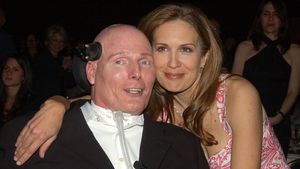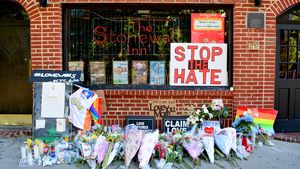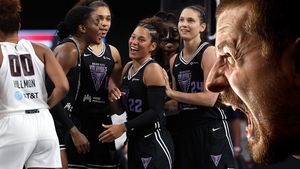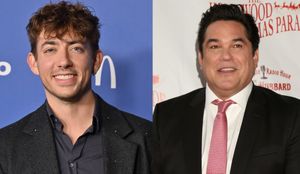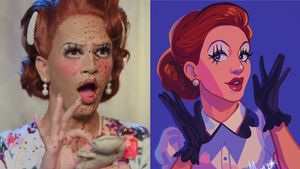Since starting at Out late last year, I've been working in an entirely LGBTQ+ newsroom, one where my work is sometimes edited by another trans woman, something that has only ever happened once before in my career. Before Out, I worked at Jezebel, which was entirely female-led and almost entirely staffed by women. Before Jezebel, I blogged for the recently shuttered INTO, where I reported to queer editors. Looking back, I want to say that it's been at least two years, if not more, since I've worked with an editor who wasn't either queer or a woman, which has made it easy to forget just how unrepresentative my experience in this industry has been.
Earlier this week, I got a reminder.
On Monday, VICE News Tonight correspondent Arielle Duhaime-Ross tweeted that she'd seen an early copy of Jill Abramson's upcoming book, Merchants of Truth: The Business of News and the Fight for Facts, which Simon & Schuster plans to publish Feb. 5. According to the publisher, the book will provide the "definitive report on the disruption of the news media over the last decade." Abramson, a senior lecturer at Harvard University who served as The New York Times' executive editor from 2011 to 2014 -- the first woman to ever hold that position -- would seem well positioned to be the one to deliver that analysis. But Duhaime-Ross, a journalist who's briefly mentioned in a section of the book that focuses on VICE, pointed to a number of "inaccuracies" that, although small on their own, call into question the integrity of Abramson's analysis as a whole.
In her description of the VICE News Tonight correspondent, Abramson calls Duhaime-Ross "a transgender woman." She's not; she's a queer, gender-nonconforming woman, which is a very different, though not necessarily mutually exclusive, thing. Abramson also describes Duhaime-Ross as biracial, Black, "impossibly hip," and utterly unqualified -- just one of many "diverse" young people VICE has hired for their relevant aesthetics and "interesting hair" rather than for their experience as journalists, which Abramson deems "scant."
"Elements of the graf paint me as an 'edgy' but inept diversity hire, rather than a competent journalist," tweeted Duhaime-Ross. "[It] paints a picture of a 'hip' outsider, who was about to go study snakes but was plucked from obscurity & plopped in front of a camera w/ zero experience in journalism or covering the environment. That doesn't resemble my career trajectory in any way."
Before joining VICE News Tonight, Duhaime-Ross -- who earned a master's degree in science, health and environmental reporting from New York University, according to her LinkedIn profile -- worked as a science reporter for The Verge, and has also contributed to The Atlantic, Scientific American, Quartz, and other outlets.
"I met @JillAbramson in June '17 in the VICE office. We chatted for less than 40 minutes. She took handwritten notes. I have not heard from her since, by which I mean she did not contact me for a fact-check," she continues. "I'm wondering what else she may have gotten badly wrong."
Other journalists tweeted photos and screenshots of additional errors they'd found while reading this early version of Merchants of Truth. Abramson, whom I was unable to reach for comment, has since tweeted that the "photos of pages circulating from my book are from uncorrected galleys," implying that the errors will be corrected before "the finished book" is published next month. Duhaime-Ross, who declined to comment on this story, tweeted Tuesday morning that she'd obtained a "final copy" of Merchants of Truth. The passage now calls her a "gender-nonconforming woman," rather than a trans woman, but continues to push the narrative that she is a stylish but unqualified queer woman of color with "no background in environmental policy."
As a journalist and trans woman myself, I found the confusion of "gender-nonconforming woman" with "transgender woman" to be a baffling error with unsettling implications. Here, we had the former executive editor of The New York Times, the top-ranking editorial position at one of the most respected newspapers in the country, seemingly admitting that she might not understand what a trans woman even is, much less what she could possibly have to offer a newsroom, were she to exist. I was disappointed by the error but not surprised -- I mean, have you read the Times' coverage of trans issues over the past 168 years? From the decades-old topics of debate found in the opinion pages to intentional jokey misgenderings in the Arts section, you never quite know what you're going to get.
Lucy Diavolo, a journalist and trans woman who works as news & politics editor at Teen Vogue, tells me that she felt pretty similarly.
"It's just a confirmation of what people have been saying for a long time," Diavolo says. "Members of the community who follow the Times have long been upset and angered by the kinds of things they are willing to publish, from the antagonistic op-eds to the skeptical bothesidesism. Abramson tells on herself when she makes the mistake she made in the passage about Arielle, and to be so dismissive of a young journalist working for VICE News Tonight is such an egregious display of arrogance. The irony that these factual errors are in a book called Merchants of Truth... What can you even say?"
Even with the correct identifiers in place, Abramson's passage still pushes a regressive narrative about who belongs in a newsroom and who doesn't. By noting a journalist's Blackness and queerness in the same passage that emphasizes her "scant experience" in environmental reporting, the author suggests that someone with those marginalized identities must have been hired because of those identities, not on account of her qualifications. Muna Mire, a journalist and queer femme who works as an associate producer on the Showtime talk show Desus & Mero, tells me that they find it "dismaying" that "someone who occupies such a prominent position in media" would not only lack such basic LGBTQ+ literacy but double down on that ignorance in favor of some greater point about marginalized people's place in media.
"Abramson painted a biased portrait of someone's qualifications, and it just so happens that this person is young, Black, queer, and gender-nonconforming. It reminded me of a piece in The Nation that came out a few years ago that basically took the same stance about the MTV News editorial staff -- this idea that these younger, social media-savvy, more diverse hires are less qualified than these older, traditional establishment journalists," Mire says.
By this logic, confusing a gender-nonconforming woman for a trans woman doesn't even matter. They're just two kinds of other here to take the place of someone more deserving who doesn't have "the look." In the "final copy" of Merchants of Truth Duhaime-Ross tweeted about Tuesday, Abramson still writes: "most of the on-air talent was very young and had scant experience; only three had ever reported on camera before. What they had was 'the look.' They were diverse: just about every race and ethnicity and straight, gay, queer, and transgender. They were impossibly hip, with interesting hair."
Along with being factually inaccurate -- VICE News Tonight has no openly trans correspondents, as Duhaime-Ross has repeatedly pointed out on Twitter -- the passage puts forth a false image of who's working in media today. Despite clocking some queers and people of color, Abramson misrepresents that white people still make up more than three-quarters of the people employed in American newsrooms, according to American Society of News Editors' 2018 survey on diversity in media, and that fraction increases as you move up to management. VICE did not provide ASNE with employee data for their 2018 survey, but the former female head of branded production described the media company as "a toxic environment where women are treated far inferior to men" in The New York Times' 2017 report on sexual harassment at VICE -- not exactly the SJW safe haven Abramson describes in Merchants of Truth. I can't find any data on trans employment in media, but, based on personal experience, it's not great, which makes me question Abramson's understanding of our shared industry.
"The whole passage Arielle shared is so telling, not just about Jill Abramson but about who is in charge of newsrooms today and how they think about diversity," says Lewis Wallace, a trans journalist who's working on a book about media objectivity called The View from Somewhere: Undoing the Myth of Journalistic Objectivity. "To see someone as powerful and well-resourced as Jill Abramson go after her credibility with the implication that she's some kind of quote, unquote 'diversity hire' because she seems cool or hip or something is so ridiculous and backwards. The idea that journalist organizations are hiring people because of our marginalized identities. We're still less likely to be hired by those organizations than by cis, white, straight men. It paints a really backwards picture of how our industry operates."



























